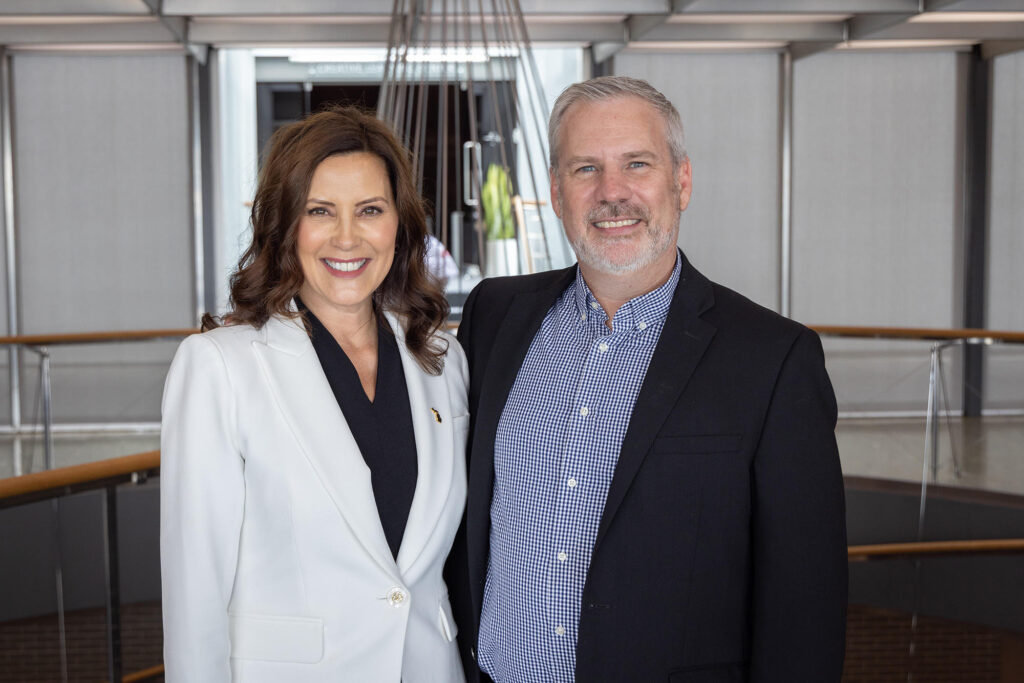
Michael Maten recognized as 2023 Alumni Merit Award recipient
Michigan Chemical Engineering alum and Director of EV Policy and Regulatory Affairs at General Motors, Michael Maten (BSE ’93) has been selected for 2023 Alumni Merit Award.

Michigan Chemical Engineering alum and Director of EV Policy and Regulatory Affairs at General Motors, Michael Maten (BSE ’93) has been selected for 2023 Alumni Merit Award.
In the evolving field of electric vehicles (EVs) and sustainable transportation, Michael Maten stands out as a driving force behind General Motors’ transformative vision. As the Director of EV Policy and Regulatory Affairs at GM, he’s at the forefront of shaping policies that align with GM’s commitment to a future marked by zero emissions.
As a Michigan Chemical Engineering alumni, Maten’s journey to this impactful role began years ago at the University of Michigan, where his passion for chemical engineering laid the foundation for his career in electric vehicle policy.
Nurturing roots and engineering dreams
Even before stepping on North Campus as a first-year engineering student, Maten’s trajectory was influenced by family and a fascination with science. With an older brother who was an engineer and a sister-in-law that was a chemist, his path seemed clear.
“I had always looked up to them as my future career aspirations came into focus,” Maten said. “Having a natural gravitation towards math and science in school, combined with the high-paying career outcomes and intellectually engaging curriculum, chemical engineering seemed like an obvious choice.”
Maten’s strong family connections to the University of Michigan, along with its renowned chemical engineering program, made it the top contender as he was considering institutions for his undergraduate degree. His grandparents were proud Michigan alumni, and the vibrant campus atmosphere appealed to his young, curious mind.
Growing up in Madison Heights, Maten faced both a cultural shift and academic challenges when he arrived on campus. The diversity of perspectives was eye-opening, expanding his worldview beyond the confines of his hometown. With determination and adaptability, he embraced these changes, and grew to thrive within the community.
Maten’s academic journey at Michigan was rich with opportunities that laid the groundwork for his future endeavors. He remembers working with Professor Scott Fogler, a renowned figure in the field, on computer simulation programs. These educational tools provided hands-on experience and a deeper understanding of complex chemical reactions.
“I got into working on computers and realized that there was more than just that typical reaction type of engineering,” Maten said. “I remember thinking at that point that there was an opportunity to do more with a chemical engineering degree, and that had a big impact on me.”
Beyond academia, Maten’s time at Michigan allowed him to develop lifelong friendships and witness iconic moments in the university’s history. The “Fab Five” basketball era and Desmond Howard’s Heisman win left an indelible mark on his memory.

In Fogler’s lab, Maten worked with Chemical Engineering peer Mike Szachta, who is close with Maten to this day and has been influential in his career. Szachta encouraged Maten to join a fraternity in their time on campus, and pursued a master’s degree in business administration after graduation along with Maten, a path that both chemical engineering alums have found essential to their success.
“Mike and I both worked for Professor Scott Fogler between our junior and senior years and graduated as chemical engineers in the spring of 93, and Mike really helped me set the path for my career going forward,” Maten said. “He moved out to Indiana. I moved to Chicago. We both moved back and interestingly enough, we both work for General Motors now.”


Evolving a career
After graduation, Maten accepted a job at Sun Chemical working on printing inks and organic pigments. As a process engineer, he knew he wanted to pursue a leadership path and started a Master’s of Business Administration (MBA) program at the University of Chicago Booth School of Business.
“I moved a little bit away from chemical engineering while I was there and more into the process automation and warehouse automation aspects,” Maten said. “That was a great job. I got to travel the world and work on a lot of different projects within those plants globally.”
Shortly after completing his MBA, Maten moved back to Detroit and secured his first role at General Motors. His technical background in Chemical Engineering paired with leadership and business skills from his MBA proved to be a valuable asset in the workplace. During his extensive career at GM, Maten’s role has shifted and evolved into the leadership position that it is now, more than 20 years later.
“I never thought I’d use that chemical engineering background again,” Maten said. “But then the opportunity came up in public policy with electric vehicles and batteries, and I’m right back into a lot of chemical engineering and materials science discussions.”
During his tenure at GM, Maten accepted a unique opportunity to live abroad in Frankfurt, Germany for a three-year period where he advanced vehicle programs within GM’s subsidiary, Opel. This international stint profoundly enriched Maten’s global perspective, an asset that proved to be imperative in many of his future roles.
“My time in Germany really satisfied the thirst for global culture and knowledge that I developed while I was at Michigan,” Maten said. “Importantly, it helped ‘round out’ my career by giving me experience not only working with a global organization but living in a different country and experiencing a different culture and lifestyle.”
Shaping the EV landscape
Today, as the Director of EV Policy and Regulatory Affairs, Maten is instrumental in steering GM towards its electrification goals. His role involves shaping policies that support electric vehicle adoption, developing EV infrastructure and ensuring a sustainable supply chain for EV batteries. Efforts that resonate with GM’s commitment to creating a world with cleaner transportation solutions.
“There are a few things that I can say I’m really proud of,” Maten said. “Recently with the passage of the Inflation Reduction Act, I had a large role going around Capitol Hill in the summer of 2021, telling anyone who would listen about the battery supply chain and how a lot of it went through China.”
The Inflation Reduction Act aims to accelerate vehicle electrification in the United States and encourages domestic mining and manufacturing to create more integrated supply chains for EVs. Maten’s role involved encouraging investment in the United States and campaigning for legislation that would allow national battery plants and supply chains closer to home.

“I really like the scale of the problems we can solve at GM,” Maten said. “Especially working in policy, being able to directly impact people in the country and around the world is incomparable.”
He credits his chemical engineering background and strong problem-solving abilities for a portion of his success. In congressional offices, it has been a key factor in Maten’s success to simplify problems like lithium extraction and explain technical data as concisely as possible to inform the decisions of policymakers.
Informing a more sustainable future
With an eye on the horizon, Maten envisions a world where vehicles are not only cleaner and safer but also seamlessly integrated into the lives of people around the globe.
“Transportation is the source of a ton of emissions worldwide, but it also enables the world to operate the way it does,” Maten said. “It enables people to get where they need to be. It enables food to be on your table. We just have to balance getting to zero emissions with going at a pace where we can accomplish that without disrupting all of society.”
Maten hopes to continue promoting electrification, carrying forward GM’s commitment to an all-electric future, and striving to make a lasting impact on the acceleration of vehicle electrification.
“I hope to leave behind a legacy that empowers decision-makers with the right information to address the complex challenges posed by vehicle electrification,” Maten said. “At the end of the day, we want to create an environment where informed choices are made that align industry efforts and government policies with the needs of a sustainable future.”
Maten’s journey from a high school student interested in engineering and chemistry to a leader in electric vehicle policy exemplifies the transformative power of education, passion and dedication. His time in Ann Arbor equipped him with technical expertise and nurtured the values and skills needed to drive positive change in the automotive industry and beyond.
As electric vehicles become an integral part of our future and Maten prepares for the next chapter of his career, his passion for accurate information, sustainable materials and policy evolution lays a strong foundation for the next generation of vehicle electrification. With leaders like Maten at the helm, the future of electric vehicles looks brighter than ever.